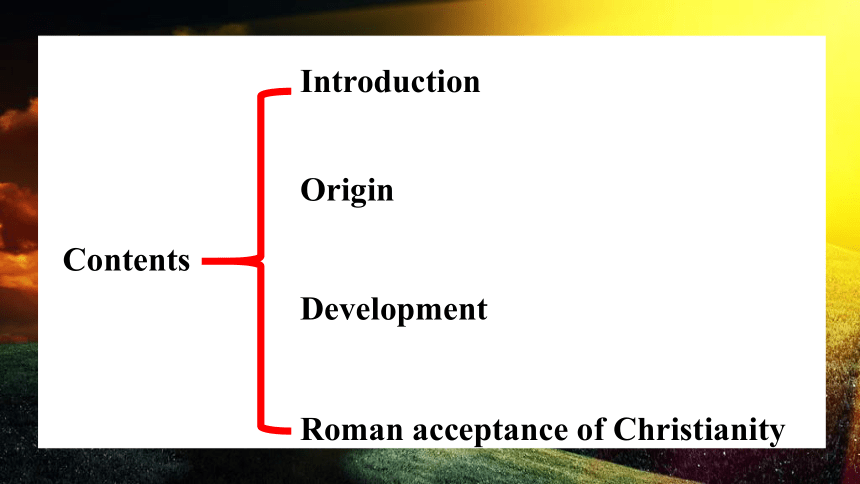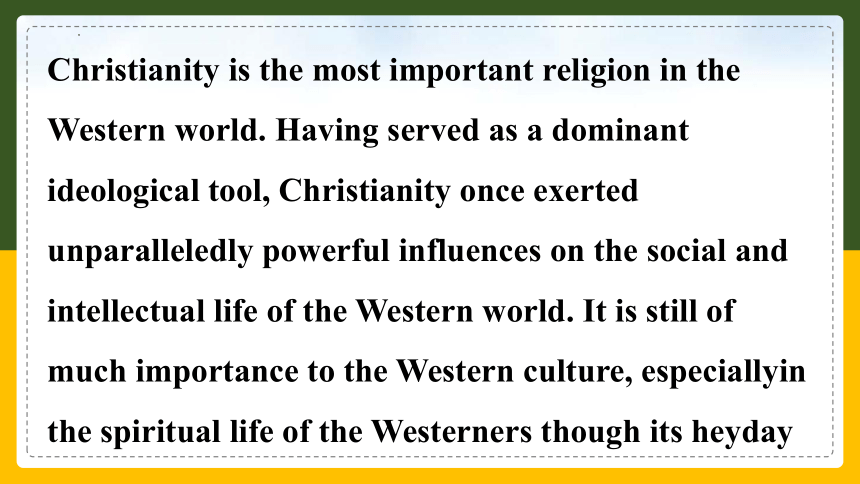高中英语基督教文化课件(22张ppt)
图片预览









文档简介
(共22张PPT)
Christianity
制作者:黄希文
Western Civilization
Contents
Introduction
Origin
Development
Roman acceptance of Christianity
1. Introduction
Christianity is the most important religion in the Western world. Having served as a dominant ideological tool, Christianity once exerted unparalleledly powerful influences on the social and intellectual life of the Western world. It is still of much importance to the Western culture, especiallyin the spiritual life of the Westerners though its heyday
has passed. It could be said that no one can really understand the West without probling into Christianity.
2. Origin
Joshua ben Joseph, a miracle worker, who is known to history as Jesus of Nazareth and to his followers as Jesus the Messiah of the Christ, preached a message of peace and love of God and neighbor, which was connected with the tradition of Hillel. His followers began to thought that he was the Messiah.
For roughly three years, many of Jesus followers ordered him to reestablish the kingdom of David. Faced with a lot of coflicts, Jesus was regarded as the man who posed threat to law and order. Pilate was troubled by anyone who had the potential for causing political disturbance, putting Jesus to death by crucifixion.
The legends of Jesus
According to the legend, Jesus is the Son of God. His life on the earth, His crucifixion, resurrection, and ascension into the heaven are evidences of God’s love for the world and God’s forgiveness of human sins, and that Jesus sacrificed his life in order to save humankind.
After Jesus death, a small group of his followers formed another Jewish sect to preach and pray daily in the temple. New members being in with baptism, the ritual soon became Christianity, which spread beyond its origin as a Jewish sect because of the work of Paul.
3. Development
Paul regarded Christianity as a seperate tradition, completing and perfecting Judaism but intended for the whole world.
Paul's teaching in the assemblies, rooted in the Jewish historical tradition, were new. He believed that god had created the human race and eternal life.
The Relationship Between Christianity and Judaism
Christianity has a close relationship with Judaism, both historically and theologically. Despite its Jewish origins, it was not long before Christianity regarded itself as something other than a new Jewish sect. In the 2,000 years of history since the birth of Jesus, the relationship between Christianity and the ancient faith in which it is rooted has often been strained. Christians have criticized Jews for rejecting Jesus as their
messiah, and Jews have criticized Christians for corrupting the concept of one God and following a false messiah. The New Testament reports that Jews were the first to persecute Christians, and after Christians became the more powerful group, they frequently persecuted Jews. Today, theological disagreements between Christians and Jews remain, but efforts are being made towards greater understanding and respect between the two great faiths.
After the deliberate sin of the first humans, Adam and Eve, god prepared for the eventual redemption, which was accomplished by Jesus. Paul thought that men and women could share in the salvation offered by god through faith.
A majority of people conversed their faith after accepting Paul's message, but they never believed that the courage Chrisitians showed in the face of persecution played an important part in their life. They refused to acknowledge the existence of the god and the cult of the genius of the emperor, which was intolerable.
The Christianity was an aggressive cult added to persecution on the Christians. For those who believed that death was the salvage of better life, martyrdom was a reward.
4. Roman acceptance of Christianity
Reasons for Roman acceptance of Christianity:
a. For the common people in the empire who were fed up with wars and social turmoil, they needed something to fill up their spiritual vacuum. Christianity could play such a role to pacify and comfort them with love and care more effectively than other organizations or religions.
Reasons for Roman acceptance of Christianity:
b. It could work together with any secular regimes to offer necessary assistance to control ideologically and intellectually the ordinary people, which was thus welcomed by the kings, emperors or aristocrats.
Reasons for Roman acceptance of Christianity:
c. The name and influence of Christianity would be a symbol of sacredness and justification, which would help the majority of people to accept the reign of a newly emerging ruler and his followers.
Reasons for Roman acceptance of Christianity:
d. Christianity is also a kind of culture, which to many people suggests social stability and recovery of an old life style they are accustomed to. Though conservative as well, it could be tolerated because their life and property could thus be secured in the changed circumstances.
Christianity
制作者:黄希文
Western Civilization
Contents
Introduction
Origin
Development
Roman acceptance of Christianity
1. Introduction
Christianity is the most important religion in the Western world. Having served as a dominant ideological tool, Christianity once exerted unparalleledly powerful influences on the social and intellectual life of the Western world. It is still of much importance to the Western culture, especiallyin the spiritual life of the Westerners though its heyday
has passed. It could be said that no one can really understand the West without probling into Christianity.
2. Origin
Joshua ben Joseph, a miracle worker, who is known to history as Jesus of Nazareth and to his followers as Jesus the Messiah of the Christ, preached a message of peace and love of God and neighbor, which was connected with the tradition of Hillel. His followers began to thought that he was the Messiah.
For roughly three years, many of Jesus followers ordered him to reestablish the kingdom of David. Faced with a lot of coflicts, Jesus was regarded as the man who posed threat to law and order. Pilate was troubled by anyone who had the potential for causing political disturbance, putting Jesus to death by crucifixion.
The legends of Jesus
According to the legend, Jesus is the Son of God. His life on the earth, His crucifixion, resurrection, and ascension into the heaven are evidences of God’s love for the world and God’s forgiveness of human sins, and that Jesus sacrificed his life in order to save humankind.
After Jesus death, a small group of his followers formed another Jewish sect to preach and pray daily in the temple. New members being in with baptism, the ritual soon became Christianity, which spread beyond its origin as a Jewish sect because of the work of Paul.
3. Development
Paul regarded Christianity as a seperate tradition, completing and perfecting Judaism but intended for the whole world.
Paul's teaching in the assemblies, rooted in the Jewish historical tradition, were new. He believed that god had created the human race and eternal life.
The Relationship Between Christianity and Judaism
Christianity has a close relationship with Judaism, both historically and theologically. Despite its Jewish origins, it was not long before Christianity regarded itself as something other than a new Jewish sect. In the 2,000 years of history since the birth of Jesus, the relationship between Christianity and the ancient faith in which it is rooted has often been strained. Christians have criticized Jews for rejecting Jesus as their
messiah, and Jews have criticized Christians for corrupting the concept of one God and following a false messiah. The New Testament reports that Jews were the first to persecute Christians, and after Christians became the more powerful group, they frequently persecuted Jews. Today, theological disagreements between Christians and Jews remain, but efforts are being made towards greater understanding and respect between the two great faiths.
After the deliberate sin of the first humans, Adam and Eve, god prepared for the eventual redemption, which was accomplished by Jesus. Paul thought that men and women could share in the salvation offered by god through faith.
A majority of people conversed their faith after accepting Paul's message, but they never believed that the courage Chrisitians showed in the face of persecution played an important part in their life. They refused to acknowledge the existence of the god and the cult of the genius of the emperor, which was intolerable.
The Christianity was an aggressive cult added to persecution on the Christians. For those who believed that death was the salvage of better life, martyrdom was a reward.
4. Roman acceptance of Christianity
Reasons for Roman acceptance of Christianity:
a. For the common people in the empire who were fed up with wars and social turmoil, they needed something to fill up their spiritual vacuum. Christianity could play such a role to pacify and comfort them with love and care more effectively than other organizations or religions.
Reasons for Roman acceptance of Christianity:
b. It could work together with any secular regimes to offer necessary assistance to control ideologically and intellectually the ordinary people, which was thus welcomed by the kings, emperors or aristocrats.
Reasons for Roman acceptance of Christianity:
c. The name and influence of Christianity would be a symbol of sacredness and justification, which would help the majority of people to accept the reign of a newly emerging ruler and his followers.
Reasons for Roman acceptance of Christianity:
d. Christianity is also a kind of culture, which to many people suggests social stability and recovery of an old life style they are accustomed to. Though conservative as well, it could be tolerated because their life and property could thus be secured in the changed circumstances.
